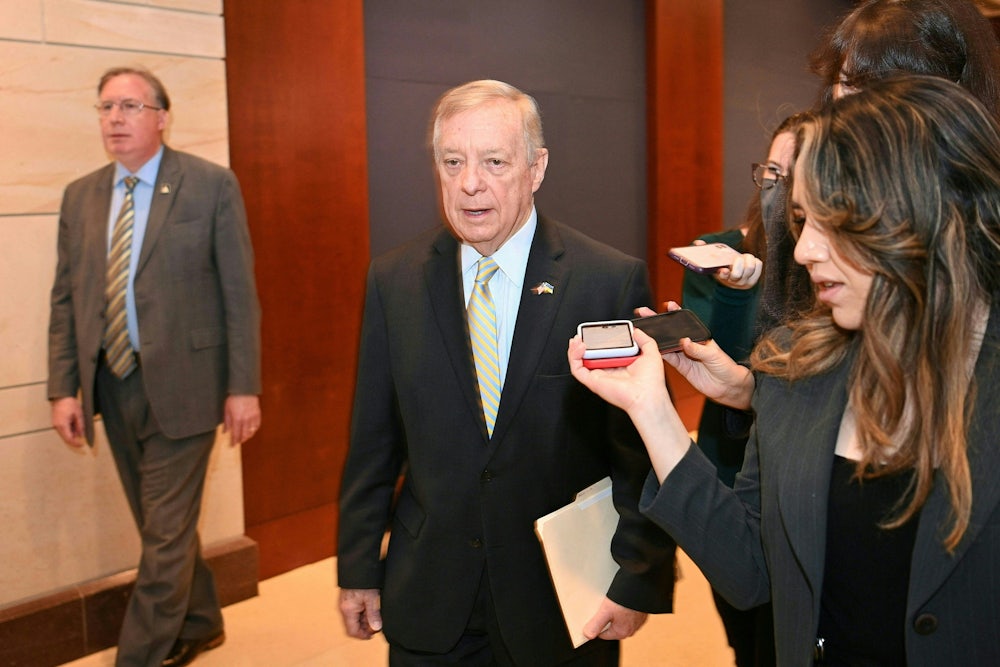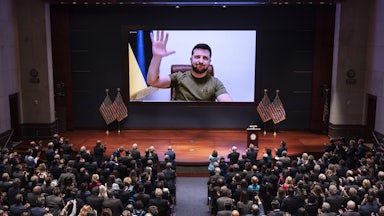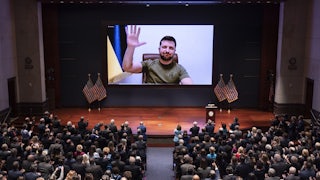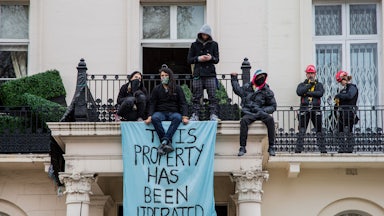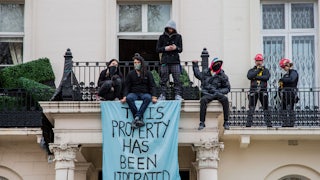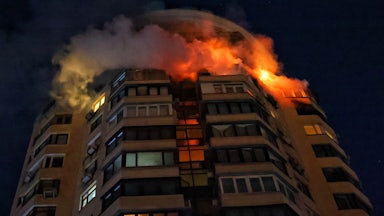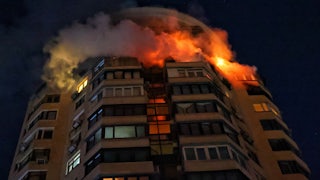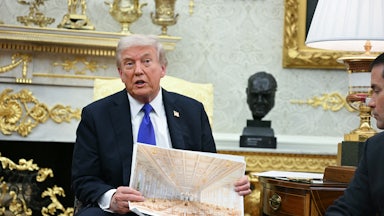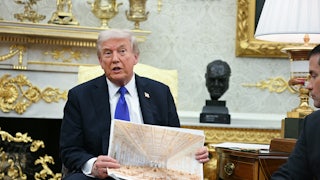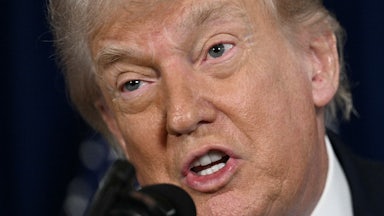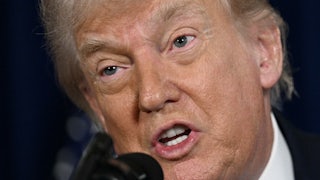The images were stark. Not the sanitized version of war, grief-filled but largely bloodless pictures and video depicting ravaged landscapes and stunned refugees. There was no warning to the audience beforehand to steel them in preparation for graphic scenes, just the shock of death and gore in the aftermath of unspeakable violence.
Ukrainian President Volodymyr Zelenskiy, delivering a brief address to members of Congress on Wednesday morning, needed lawmakers to see the full scale of the damage to his country. He spoke for a few moments in Ukrainian, touching upon famous phrases and moments in American history, repurposing the language of Martin Luther King Jr.’s “I have a dream” to Zelenskiy’s own “I have a need,” and invoking the images of Pearl Harbor and the September 11 terrorist attacks. He then presented a video of the violence inflicted on Ukraine since Russia invaded at the end of last month: a stirring, horrifying montage of death and destruction, underlaid with a soundtrack of melancholy strings.
Some members of Congress wiped their eyes as they watched the onslaught of gruesome images, others covered their mouths in shock and horror. The final image was a black screen, with the words “Close the sky over Ukraine” in white.
When Zelenskiy spoke again after the video ended, it was in English, a direct appeal to lawmakers and to President Joe Biden, to enforce a no-fly zone over Ukraine and to send more shipments of fighter jets. “To be the leader of the world means to be the leader of peace,” he said.
“It was a speech that if you’re human, you had to feel. If you’re human, you had to be proud of him. If you’re human, you know that he is standing up for right and good, and that we have to unite,” Representative Gregory Meeks told reporters after the address.
Zelenskiy has transformed himself from a sitcom star and comedian into a wartime president over the span of just a few years. The skill set that catapulted him into power has, in part, made him an effective communicator: He understands the power of the camera and of personal appeal. With addresses like the one to Congress on Wednesday, sporting a shadow of stubble and his now-signature khaki T-shirt, Zelenskiy is redefining what it means to lead a besieged nation.
Senator Chris Coons noted to The New Republic that this marked the third time he had heard from Zelenskiy in recent weeks, following the Munich Security Conference last month and in a zoom call with lawmakers after Russia invaded. “All three of those presentations were emotional, powerful, urgent. But I think today’s was far, far and away the most impactful,” Coons said.
Lawmakers from both parties agreed that it was an effective appeal by Zelenskiy, and in particular having his remarks punctuated by the graphic video of a sort not typically seen in public gatherings in Congress. “You could have heard a pin drop in that room. There was barely a breath,” Senator Richard Blumenthal told The New Republic after the address. Coons said that he “could see an emotional immediate response from the House and Senate members.”
“To just see the sobering on the ground impacts of this unprovoked, unnecessary, and inhumane war that Putin has started—I think all of us walked away with a renewed sense of commitment to peace,” Representative Lisa Blunt Rochester told reporters, her voice shaky with emotion.
The Ukrainian president has galvanized Western global leaders with his selfie videos walking through the streets of Kyiv and personal meetings, the trope of an entertainer knowing his audience exemplified in a tragic extreme. “Throughout the invasion, messaging, the use of social media to communicate, has been effective, sure, for morale on the ground in Ukraine [and] to rally support around the world,” Senator Alex Padilla told reporters after the address.
By referencing times when the world rallied around the United States in the wake of devastating attacks, Zelenskiy met members of Congress on their own historical ground. “I have a dream. These words are known to each of you today,” he said in the first portion of his speech, through a translator. “I can say, I have a need. I need to protect our sky. I need your help.” Zelenskiy has proved successful in convincing Congress to push the White House further, as demonstrated by the inclusion of aid to Ukraine in last week’s omnibus appropriations package that was several billion dollars more than originally expected.
“He’s an incredibly effective communicator. He always has been. That’s why he’s president, that’s why he won in a landslide vote,” Senator Chris Murphy told The New Republic. “I think he’s right to connect it to the broader struggle for freedom. He referenced a lot of American symbols of democracy, as he should. The health of our democracy is directly tied to what happens in Ukraine over the course of the next several weeks and months. He hit all the right notes.”
Despite the Ukrainian president’s bravura performance, his wished-for closing of the skies will likely go unfulfilled. Although a no-fly zone over Ukraine has received limited support from some members of Congress, most members acknowledge that enforcing it, which would necessarily involve American airmen engaging directly with Russian fighters and targeting their anti-aircraft positions in Russian territory, would be tantamount to declaring war with Russia and, in all likelihood, dragging our NATO allies into a wider conflict. For the moment, Zelenskiy is still mostly unable to sway lawmakers in that regard.
“That does set up a much more widespread conflict, and that would pull all of our NATO partners in,” said Senator Joni Ernst. But some members of Congress appeared convinced by the alternative offered by Zelenskiy, providing additional aircraft and anti-aircraft missile systems. Senator Dick Durbin, the majority whip, said he was “totally supportive” of additional air defense support.
GOP lawmakers have also been pressing Biden to facilitate the transfer of MiG fighter jets from Poland to Ukraine and backfill them for Poland with American-made F-16 fighter jets.
“If Zelenskiy is asking for MiGs, let’s send him MiGs. If he wants us to send a bunch of Ford F-150s, send them a bunch of Fords. I don’t care what he’s asking for. We should say, ‘You know what? We’re going to help you with that,’” Ernst said.
Meeks, the chair of the House Foreign Affairs Committee, told reporters that “everything is still on the table” regarding MiGs, and said that S-300 anti-aircraft missile systems are already in Ukraine, with more incoming.
Just a few hours after Zelenskiy’s speech, Biden announced an additional $800 million in military aid to Ukraine, bringing the total of U.S. security assistance to Ukraine this week to $1 billion. The package includes 800 anti-aircraft systems, and Biden vowed that the U.S. has “identified and [is] helping Ukraine acquire additional longer-range anti-aircraft systems.”
“This could be a long and difficult battle, but the American people will be steadfast in our support of the people of Ukraine in the face of Putin’s immoral, unethical attacks on civilian populations,” Biden said. “We are united in the abhorrence of depraved onslaught, and we are going to continue to have their backs as they fight for their freedom, their democracy, their very survival.”
But Biden did not say whether the U.S. would facilitate the transfer of MiGs. And as Russian aggression in Ukraine continues, Congress may push Biden even further to aid Ukraine, particularly as Zelenskiy continues his personal appeals.
“I don’t know how long the patience is going to last here,” said Representative Michael McCaul, the Republican ranking member of the House Foreign Affairs Committee.
